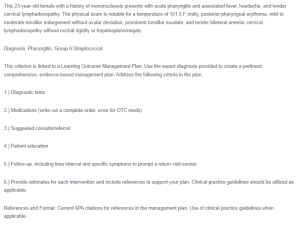Case Study – Patient with Acute Pharyngitis
In this case, a 23-year-old female was diagnosed with acute pharyngitis, which is inflammation of the pharynx due to a Group A Streptococcal infection. This paper discusses the proper diagnostics, medical treatment, consultants, patient education, and follow-up plans that should be organized and justified based on evidence-based literature.
Diagnostic Tests
First, points involved in the diagnostic tests should include carrying out the RADT for Group A Streptococcus, which is highly specific and rapid. If RADT is negative but clinical suspicion is high, the preferred confirmatory test is a rapid antigen test on a throat swab since this test is highly sensitive (Kim et al., 2019). Also, basic sets like a complete blood count (CBC) can be employed to check for leukocytosis, which would help to support the bacterial infection diagnosis.
Medications
For this patient, the main type of treatment should be antibiotics, as the primary component of the medication plan. That is why Penicillin, 500 mg every 12h for 10d, was chosen as the recommended antibiotic, as it has a good efficacy/safety profile and a narrow antimicrobial spectrum (Yip & Gerriets, 2022). The appropriate antibiotic for patients with penicillin allergy is Azithromycin: 500 mg on the first day and 250 mg for the next four days. Pain/fever medications: Ibuprofen 400 mg to be taken every 4-6 hours as needed. Over-the-counter treatments; Other measures that provide symptomatic relief include throat lozenges and saline gargling.
Suggested Consults/Referral
These should be made depending on the response of the patient as well as the development of any of the complications as highlighted above. If symptoms still exist even with the development of antibiotic therapy or the presence of signs of peritonsillar abscess or other complications, then an otolaryngologist referral should be made (Gupta & McDowell, 2019). However, if there is a suspicion of systemic disease or severe, sustained symptoms, one could also refer to the specialist in infectious diseases.
Patient Education
Education of patients is very important when it comes to acute pharyngitis. The patient should be advised of the significance of the utilization of the complete prescribed course of antibiotics regardless of the improvement of the symptoms of the disease. Stress on the importance of consumption of fluids, getting enough sleep, and staying away from/film, tobacco, etc. Known precautions, such as good hygiene of the patient’s hands, should also be suggested (Wolford & Schaefer, 2023). It is also necessary to explain to the patient the possible side effects of medications and when he or she has to consult a doctor or an anesthesiologist.
Follow-up, Including Time Interval and Specific Symptoms to Prompt a Return Visit Sooner
Further recommendations are to have a check-up within 48-72 hours if the condition has not changed. The patient should be advised to come back earlier if they notice a decline in their condition, for instance, dysphagia, dyspnoea, severe neck pain, or evidence of systemic illness like rash or continuous fever (Thomas & Bomar, 2023). Subsequent follow-up is usually unnecessary after the course of antibiotics has been taken, apart from if the bowels relapse.
Rationales for each Intervention
According to the Infectious Diseases Society of America (IDSA), RADT and throat cultures are the most appropriate methods that should be used in diagnosing croup (Ashurst & Edgerley-Gibb, 2023). Different antibiotics to be used are chosen from the most effective and least toxic antibiotics by the American Academy of Pediatrics (AAP) and the IDSA. Further, drugs like Ibuprofen for the treatment of pains and fevers have support from research findings. It is crucial that, with the resolution of the infection, follow-up education and recommendations be offered to the patient for total patient care.
Conclusively, acute pharyngitis due to Group A Streptococcus, a case of a 23-year-old female, is best managed using an updated, professional approach. The aspects of accurate diagnostic investigations, proper pharmacological approach, timely interactions, proper counseling of patients and subsequent monitoring can significantly help in achieving the best results and reducing the chances of any adverse effects in the future. It is important to maintain proper standard measures while attending to the patient to enhance their healing process in the delivery of care.
References
Ashurst, J. V., & Edgerley-Gibb, L. (2023). Streptococcal pharyngitis. Nih.gov; StatPearls Publishing. https://www.ncbi.nlm.nih.gov/books/NBK525997/
Gupta, G., & McDowell, R. H. (2019). Peritonsillar Abscess. Peritonsillar Abscess. https://www.ncbi.nlm.nih.gov/books/NBK519520/
Kim, H.-N., Kim, J., Jang, W. S., Nam, J., & Lim, C. S. (2019). Performance evaluation of three rapid antigen tests for the diagnosis of group A Streptococci. BMJ Open, 9(8), e025438. https://doi.org/10.1136/bmjopen-2018-025438
Thomas, M., & Bomar, P. A. (2023). Upper respiratory tract infection. National Library of Medicine; StatPearls Publishing. https://www.ncbi.nlm.nih.gov/books/NBK532961/
Wolford, R. W., & Schaefer, T. J. (2023). Pharyngitis. PubMed; StatPearls Publishing. https://www.ncbi.nlm.nih.gov/books/NBK519550/
Yip, D. W., & Gerriets, V. (2022, May 19). Penicillin. PubMed; StatPearls Publishing. https://www.ncbi.nlm.nih.gov/books/NBK554560/
ORDER A PLAGIARISM-FREE PAPER HERE
We’ll write everything from scratch
Question
This 23-year-old female with a history of mononucleosis presents with acute pharyngitis and associated fever, headache, and tender cervical lymphadenopathy. The physical exam is notable for a temperature of 101.5 F orally, posterior pharyngeal erythema, mild to moderate tonsillar enlargement without uvular deviation, prominent tonsillar exudate, and tender bilateral anterior cervical lymphadenopathy without nuchal rigidity or hepatosplenomegaly.

Patient with Acute Pharyngitis
Diagnosis: Pharyngitis, Group A Streptococcal
This criterion is linked to a Learning Outcome Management Plan: Use the expert diagnosis provided to create a pertinent, comprehensive, evidence-based management plan. Address the following criteria in the plan:
1.) Diagnostic tests
2.) Medications (write out a complete order, even for OTC meds)
3.) Suggested consults/referral
4.) Patient education
5.) Follow-up, including time interval and specific symptoms to prompt a return visit sooner
6.) Provide rationales for each intervention and include references to support your plan. Clinical practice guidelines should be utilized as applicable.
References and Format: Current APA citations for references in the management plan. Use of clinical practice guidelines when applicable.

